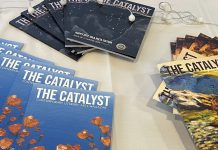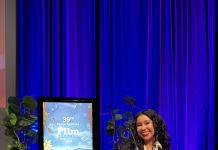Richard Smith
Contributing Writer
This week’s performance of the UC Santa Barbara (UCSB) World Music Series showcased “The Dawn of the Rooster,” which was composed and performed by the brilliant and talented Tanyaradzwa A. Tawengwa. Tawengwa, a Ph.D. student from the University of Kentucky, was accompanied by pianist Jared Holton and joined by students from UCSB to help with narration.
“The Dawn of the Rooster” is an opera that details a young woman’s involvement in Zimbabwe’s struggle for liberation. The story’s chilling resolution and the music’s emotional richness made for the most sentimental performance in this series thus far. This performance was held in the Karl Geiringer Hall rather than the usual Music Bowl, making for beautiful acoustics and an intimate environment for audience participation.
Tawengwa started the performance by teaching the audience the word pamberi, which was used as a rallying cry for soldiers fighting for liberation. The phrase means something like “go” or “forward.” At times, Tawengwa would cry out this word and the audience would reply passionately in rhythm.
The performance began with “Muka Iwe,” a slow and somber song about the rigors of the main character’s morning routine. The piece included Tawengwa’s beautiful soprano voice accompanied by Holton’s powerful piano performance. It concluded with a narration about the cruel regime of Ian Smith and European infantilization of the Zimbabwean people.
Next was the cheerful “Penya Penya” during which Tawengwa sang a bright and uplifting tune to greet the morning and contrast the bleak sunrise of the last song. Accompanied this time by audience snapping instead of piano, the song had an air of simplicity and individualism. The concluding narration told of a young African woman who grew up to resent her society which was even more cruel to the women than to the men.
Tawengwa brought out her mbira, an African instrument, for the third song “Nehondo,” which was a tragic and dramatic retelling of major Zimbabwean figures killed during the conflict of the story. One could feel the pain of the loss of a national hero as the mbira gave way to the piano to accompany the vocals instead. Shifting back to mbira to end the song, the mbira performance ends sharply without resolving the melody, a stark reminder of the song’s subject: death.
The sound of the mbira is difficult to explain, but it could be described as a metallic percussive sound combined with a buzzing similar to when one hovers their hand too close to a ringing guitar string. The concluding narration told of segregation in Zimbabwe schools and the curriculum of European history without Zimbabwe history or science.
The fourth song was “Smith Akaramba Mbuya Nehanda,” a cheerful war rally against the oppressive Ian Smith. The piece contained primarily vocals and piano, with participation from the audience in a rhythmic sound effect prompted by Tawengwa. The narration afterward told of how revolutionary songs were hidden in Methodist hymn books. One of those revolutionary songs, “Ishe Komborera Afrika,” was a patriotic and holy song singing praise to Africa, expressed through Tawengwa’s vocals and the piano with a special guest choir: the audience!
Next was instrumental-heavy “Munamato,” a deliberate and meditative piece joining the mbira and piano together. The narrator also told some of her childhood stories and experiences in Zimbabwe and desire to learn more about the country’s history. This eventually led into “Rarisa Musoro Wako,” a slow and beautifully agitated piece calling for a loved one to take some time to rest and a story of personal experience in racism and prejudice in Zimbabwe.
The eighth song was then “Mufuduzi Ndiye Jehova,” a beautiful piano and vocal piece that was simultaneously sorrowful and hopeful. The narrator told of her decision to join the fight before the next song: “Famba Iwe,” a forcefully dramatic and driving war march including the mbira, voice, and piano.
Finally was the heartbreaking “Hurombo Gara Wega,” with the piano only temporarily accompanying Tawengwa’s virtuosic and emotional singing. The lyrics and melody gave an air of desperation and isolation.
What could this have meant? Was our narrated abandoned or captured in battle? Is it simply a cry from all the Zimbabwean people for the European oppressors to “leave us alone”? That is left up to the listener to interpret, and although the listeners might not agree what happened to our narrator, every listener’s eyes were wet by the end of the performance when even the piano had abandoned Tawengwa’s haunting singing.
The World Music Series is co-presented by the UCSB MultiCultural Center and the Ethnomusicology Program in the Department of Music and is hosted in the Music Bowl on Wednesdays at 12 p.m.









I went very well
I saw him closely
it was a great show. we enjoyed of course
hosted by very well people. i loved thanks to the dawn of the rooster
it was a great
That was great but unfortunately because of COVID19 lock down we can’t have these performance any more 🙁
Comments are closed.